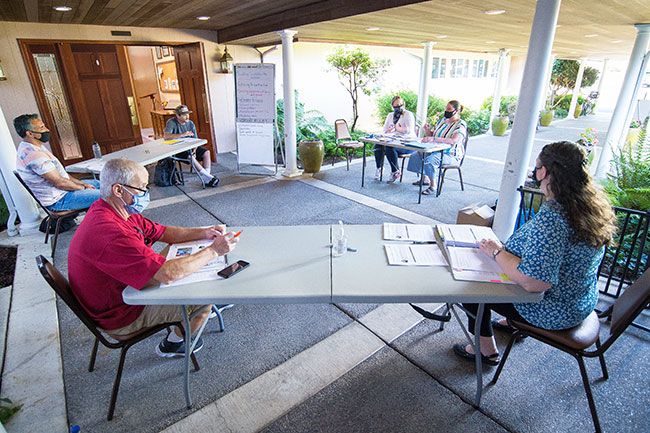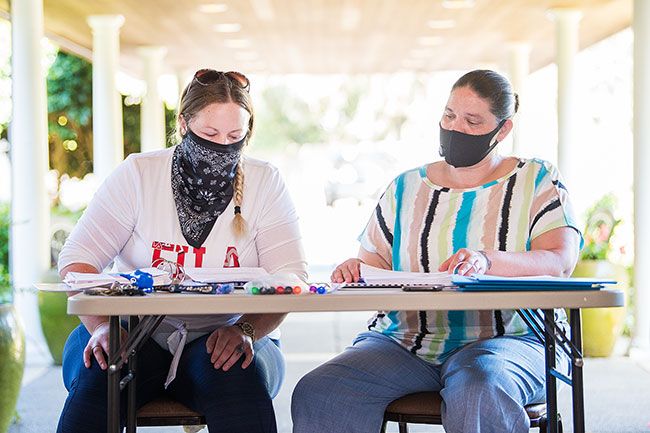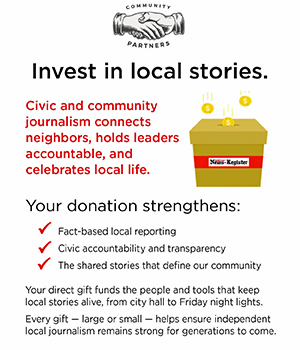Putting their minds to it


Some job seekers have already overcome major problems — gotten off drugs, served jail time or moved from the streets into safe housing. But they still might need help in surmounting an overwhelming obstacle in finding employment: their own self-defeating mindsets.
The Willamette Workforce Partnership (WWP) “Rethinking Barriers” program addresses that by training the addicted, homeless or incarcerated to think “I have something to offer” rather than “nobody wants me anyway, so why even try?”
“A lot of programs look at helping people with résumé-building or interview skills,” said Chelsie Sanders, one of the program’s peer facilitators.
“This is a different aspect that’s not addressed as much,” she said. “This is about the mental and emotional barriers we place on ourselves, or that society places on us, that we might not even realize are barriers.”
That stark contrast became clear to Sanders when she attended the Rethinking Barriers class as part of her training as a facilitator. She had been through several other programs and mentorships when she tried to re-enter the workforce after going through recovery herself.
She had found help through Hope on the Hill, a nonprofit community organization, then gone on to facilitate a group there. She also became a public speaker, offering her own experiences as examples to offer others hope with their struggles.
When she heard about the Rethinking Barriers course, it was being piloted in Yamhill County under the direction of WWP consultant Susan Barksdale.
A psychotherapist, Barksdale developed the new programs based on cognitive behavioral therapy.
“We deconstruct what isn’t working, and reconstruct their thinking,” she said. “We develop new neural pathways so it becomes automatic.”
Sanders became one of the program’s board members, as well as a facilitator.
“I thought it would be a perfect fit with my schedule and the work I like to do,” she said.
Sanders, whose experience gave her empathy, and co-facilitator Tierney Ferguson are the kind of people Barksdale was seeking.
“There’s real power to having peer facilitators. It’s extremely effective,” she said. “They are models who show it can be done.”
A professional might not be able to offer the same insight. “They have walked the walk,” she explained.
The facilitators also help recruit students for the program. They work with support organizations such as Provoking Hope, the Champion Team and Hope on the Hill to find participants, along with partner Remnant Initiatives, a Newberg-based program that helps former inmates adapt to society.
“We have our feelers out,” Barksdale said. “People don’t have to have all these barriers to qualify. But they do have to meet a condition: that they’re not actively using drugs.”
Rethinking Barriers is one of three WWP programs Barksdale developed during 11 years at the agency.
She first created Rethinking Job Search, which used cognitive behavioral techniques to help participants return to work more quickly. The Department of Labor contributed $3 million so the state could run the program for five years.
More recently, she added Rethinking Careers, a program aimed at young people and adults who have never been employed, and then Rethinking Barriers.
For the Yamhill County pilot, Barksdale trained Sanders and Ferguson, who was a student in the initial pilot class in 2019. Both facilitators are now certified by the National Association of Cognitive Behavioral Therapy.
“They have had many barriers in the past and are now contributing members of society,” she said. “They are perfectly poised to lead others to healthy thinking, emotions and behaviors, resulting in employment.”
The facilitators recently finished leading their first set of classes. St. Barnabas Episcopal Church provided the space. The program also is supported by grants from First Federal, the Give a Little Foundation, Sunrise Rotary, Cuvee and Remnant Initiatives.
The program also receives assistance from students interns at Linfield University and Western Oregon University.
Because of the coronavirus pandemic, the Rethinking Barriers course that started in early summer stopped after a few sessions. Facilitators resumed in late August, holding classes outside and using social distancing and facemasks.
“We were excited to get back,” Sanders said.
So was the group, which was intentionally small so there would be plenty of personal attention and interaction.
“We all share what we’re comfortable sharing,” Sanders said. “Everyone has a chance to be heard.”
They speak about confidence, and the lack of it.
For example, someone with a felony record or a history of addiction may not think they’re worthy of a job, or that society sees them that way, even if it’s not true, Sanders said.
Rethinking Barriers addresses those misperceptions directly. “We look at how we accept criticism, and the beliefs we have,” she said. “Do those beliefs serve us?”
Facilitators and students also examine appropriate work behavior. They discuss everything from timely attendance to wearing appropriate attire to knowing “how to interact and engage.”
For instance, they discuss being criticized or corrected by a manager. It’s usually not personal, Sanders said. Instead of thinking they are being blamed, or blaming themselves, they learn to view instructive criticism as a way to improve.
Ferguson said she and her co-facilitator also encourage students to be in the present, rather than thinking ahead about what can go wrong.
She used an example of a job interview she had before taking the Rethinking Barriers class. She was so involved in speculating about what the interviewer might ask next, she said, that she had a hard time answering the current question.
She didn’t get the job — a good thing, actually, she said, since she found a better job after finishing the class.
But if she had it to do again, with the benefit of the cognitive behavioral training, she said, she would slow down and focus.
Ferguson is just the type of student who benefits from Rethinking Barriers, Barksdale said.
A former homeless addict, she now is looking toward a bright future. “She’s smart, but she needed the social skills she learned in Rethinking Barriers,” she said.
The cognitive restructuring aspect of the program makes all the difference in changing a defeatist attitude, she said.
“It builds work readiness, builds credibility and prepares them to behave in a way that’s more helpful to themselves,” she said.
Kathy Byers of First Federal, one of the program’s most enthusiastic champions, said she especially appreciates the psychological aspect of the program.
Building confidence and removing social and emotional barriers are key to long-term success, she said.
“People who struggle to make it in the mainstream need that kind of support,” she said.
Barksdale described Rethinking Barriers as “the most exciting project” with which she has been involved, not only by helping participants improve their thinking and their lives, but by saving the state money by reducing unemployment.
“It makes such an impact,” she said.
Funding already is in place for five classes, including pay for the facilitators, materials and oversight. She expects at least 30 people to have graduated by June 2021.
Afterward, she wants to take the program beyond Yamhill County, with classes in Marion, Polk and Linn counties.
“We’re poised to continue,” she said.
For facilitator, a new path
Rethinking Barriers facilitator Tierney Ferguson was “fresh out of jail, trying to stay sober,” when she first heard about a different kind of job training program.
She met Susan Barksdale of Carlton, a mental health and jobs advocate, who founded Rethinking Barriers. Both were volunteering to serve meals to people in need at the Soup Kitchen @ St. Barnabas.
“She wanted to help me,” Ferguson recalled.
Soon the McMinnville woman was enrolled in the program, which helps students “retrain their brain” so they gain confidence and impede when looking for employment.
“I got it,” she said. “And now I enjoy passing that along to others and helping them have a positive mindset.”
Like many people who come to Rethinking Barriers, Ferguson, 38, had a history of drug use going back to childhood and a pattern of using, getting arrested, sobering up, then using again following her release. She described herself as a slave to marijuana and methamphetamines.
“I was a pothead for more than 20 years,” she said.
Looking back, she said, there were periods when she wasn’t using, but never long enough to completely rid herself of toxic substances. “I never felt sober,” she said.
In early 2019, though, she spent 30 days in jail and came out resolving to quit for good. It wasn’t easy, but she was doing well even before she met Barksdale.
The Rethinking Barriers class was a huge help “with the bumps in the road, so they didn’t get you down.”
She had already been job hunting before she started the class. She even made it to the interview stage, but wasn’t hired.
She learned in the class that she shouldn’t take rejection personally. Lots of people get turned down. It wasn’t that she was inherently bad, she realized, and she found the courage to try again.
“In Rethinking Barriers, you learn to control your emotions and turn things into a positive,” she said.
She learned, as well, to not create her own barriers. “Slow down, actively listen, go step-by-step,” she said. “I definitely recommend that.”
Her own experiences helps in her work as a facilitator. She can empathize.
“It’s about retraining your brain,” she added. “That can be difficult, uncomfortable, but the more aware you are, the more you recognize that you’re doing, the better you’ll be.”
In addition to being hired to facilitate future classes, after graduating Ferguson found a job at McDonald’s. She has worked her way up to manager.
“I am totally respected, and I adore my job,” she said. “My coworkers respect me. That’s pretty cool.”
She also is supervising her children’s online learning. She’s proud to be with them, to have a home and earn a living.
“Five years ago, I was on the streets, homeless. I never would have imagined this,” Ferguson said. “It feels really good to be able to relate to people.”
She’s even planning to enroll in college. She’s considering studying psychology or social work, and learning about human behavior.
“What makes the brain think that way?” she asked. “I wonder about that.”













Comments
llehman
The world needs more programs like this. Very Impressive.